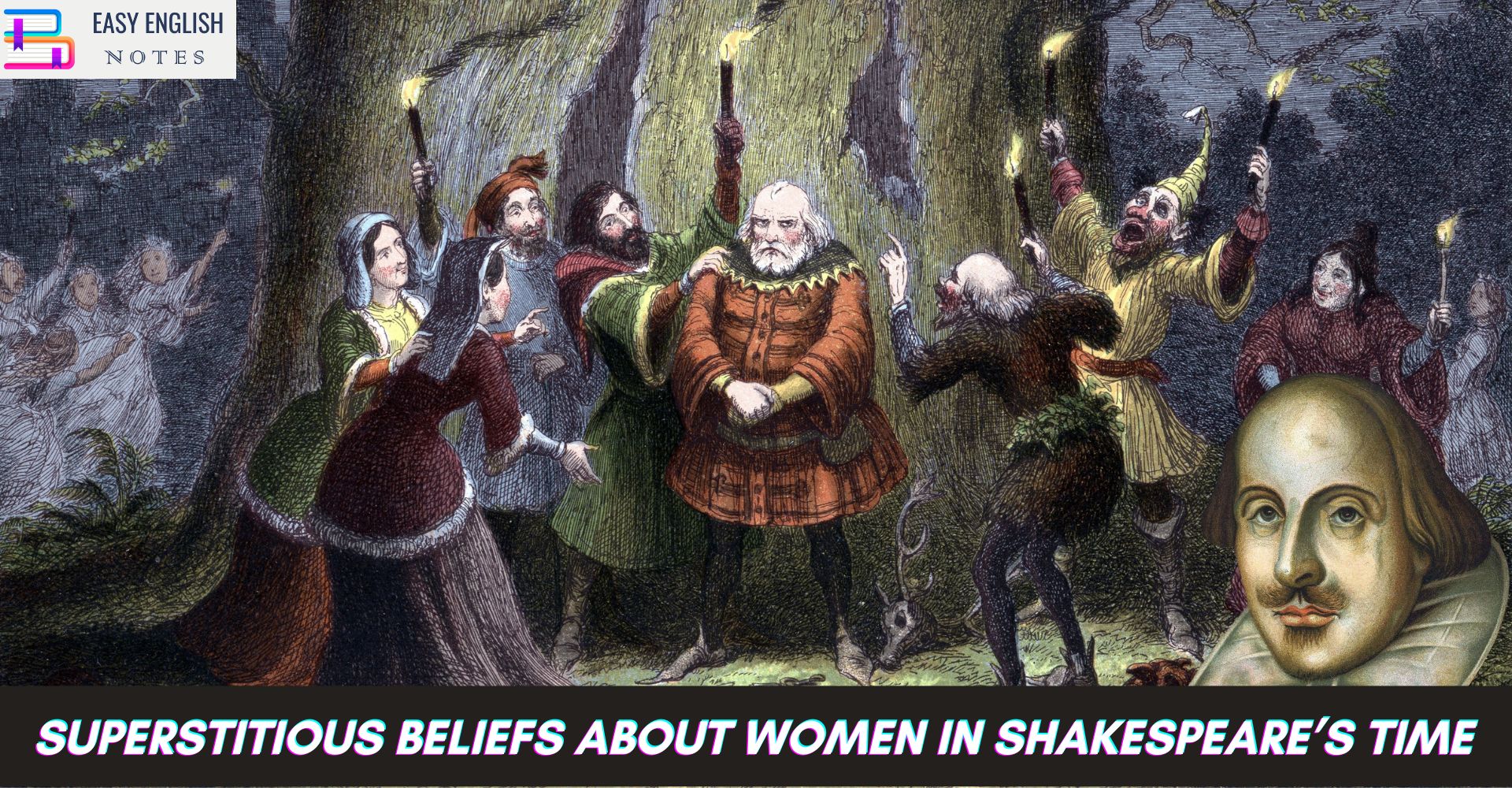A lot of superstitious beliefs regarding women in Shakespeare’s day had to do with social deviancy and witchcraft. Unmarried women, especially those who were old, were often suspected of being witches. There were very few occupations available to women in Elizabethan England outside of being a wife and mother, so a woman who was not either was considered a little strange.
Many women practiced folk healing to support themselves in the absence of a job or husband, and their herbal remedies were sometimes believed to be magical spells or proof of deals with the devil.
Women’s reproductive biology had a lot of superstitions, as well. From the Medieval Period onward, a menstruating woman was believed to have a terrible influence about her. Folklore from around England and other parts of Europe dictated that a menstruating woman’s touch would kill plants, prevent bread from rising, and cause all manner of food to spoil. At the same time, most Elizabethans were of the opinion that the menstrual cycle was both natural and healthy. The dominant theory of health in Shakespeare’s time involved the Four Humors—four fluids which circulated about the body and were in constant flux. Too much or too little of any one was bad for the health, and it was believed that menstruation was simply a woman’s way of letting off a little excess blood every month.
With regards to Shakespeare’s work, women were considered bad luck on the stage, and so women’s roles in plays were acted by young boys. 1 suspect that the belief about women on stage being bad luck had far more to do with the social dynamics of the time than any superstition. In Shakespeare’s time, women were believed to be inferior to men in all but one respect- they could bear children. In anything else a woman did, she was not as good as a man, and this would have applied to the performing arts as well. Of course, theatre and acting did not have the air of luxury that they carry today. Actors were considered to be very low class people, and theatres were pits of moral degeneration. Sex workers often waited outside of theatres for a client to come by, and a woman on stage might have been taken as a sex worker. This could cause all sorts of social unrest, regardless of whether she actually was a sex worker or not. Though the Shakespearean theatre was a dirty place of generally low morals, I think Elizabethan people would still have been outraged to believe that a sex worker was performing on stage and receiving their money.
Also Read :
- Compare Hamlet with Macbeth, Othello and other Tragedies
- “The Pardoner’s Tale” is the finest tale of Chaucer
- Prologue to Canterbury Tales – (Short Ques & Ans)
- Confessional Poetry – Definition & meaning
In Shakespeare’s time, society held numerous superstitious beliefs about women that reflected the prevailing gender biases and stereotypes of the era. These beliefs were deeply rooted in the cultural and religious norms of the time and influenced how women were perceived and treated. More superstitious beliefs about women in Shakespeare’s time include:
Witchcraft and Sorcery:
Women were often associated with witchcraft and sorcery, and this belief was rooted in the prevalent fear and suspicion of women who possessed knowledge of herbs, healing, or other practices that were seen as supernatural. Women accused of witchcraft were often subjected to persecution and trials.
Female Hysteria:
It was believed that women were more prone to hysteria, a condition characterized by emotional instability, irrational behavior, and physical symptoms such as fainting or fits. This belief was based on the notion that women’s bodies were inherently weaker and more susceptible to emotional and physiological imbalances.
The Evil Eye:
Women were sometimes thought to possess the power of the “evil eye,” the ability to cast curses or bring misfortune upon others. This belief was rooted in the idea that women had a mysterious and dangerous influence over men and could manipulate them through supernatural means.
Lunar Influence:
There was a belief that women’s behavior and emotions were influenced by the phases of the moon. Women were seen as more erratic and volatile during certain lunar phases, contributing to the stereotype of women as unpredictable and irrational.
The “Weaker Vessel”:
Women were often considered physically and emotionally weaker than men. This belief stemmed from religious teachings that portrayed women as the weaker vessel, more susceptible to temptation and sin. It also reinforced the notion of women as needing protection and guidance from men.
Changelings and Fairy Abductions:
Superstitions surrounding the birth of children played a role in shaping beliefs about women. It was believed that fairies or supernatural beings could exchange a human child with a changeling, an imposter creature. Women, particularly new mothers, were sometimes blamed for having a “changeling child” and were subjected to suspicion and ridicule.
These superstitious beliefs about women in Shakespeare’s time reflected the broader patriarchal society’s attempts to control and marginalize women. Women were often regarded as mysterious and potentially dangerous beings, associated with supernatural powers and capable of disrupting the established social order. These beliefs perpetuated gender stereotypes, limited women’s agency and autonomy, and contributed to the marginalization and persecution of women deemed to be deviating from societal norms.
PLEASE HELP ME TO REACH 1000 SUBSCRIBER ON MY COOKING YT CHANNEL (CLICK HERE)











